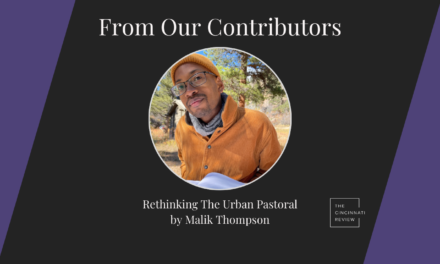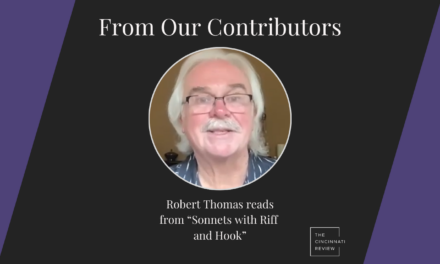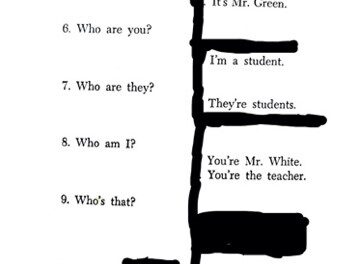The feast cont inues with the second course in our feature Pas de Deux, in which Jennifer Murvin turns the tables on fellow 10.2 contributor Christa Romanosky and asks how in the heck she came up with her ironic, biting, and heartbreaking story “Assets.” In what follows, Romanosky reveals her secret recipe: one part biography, eight parts imagination, and two parts kitten experiment, with a dash of Deborah Eisenberg.
inues with the second course in our feature Pas de Deux, in which Jennifer Murvin turns the tables on fellow 10.2 contributor Christa Romanosky and asks how in the heck she came up with her ironic, biting, and heartbreaking story “Assets.” In what follows, Romanosky reveals her secret recipe: one part biography, eight parts imagination, and two parts kitten experiment, with a dash of Deborah Eisenberg.
Jennifer Murvin: “Assets” is both wickedly funny and deeply moving. The narrator Louise Hayle approaches rather serious conflicts with a sarcastic and clever charm; for example, the word “asset” functions in the narrative as both verbal and situational irony. Tell me about the role of humor in your writing. Did you have any writers or stories in mind as a model while creating the voice of your narrator?
Christa Romanosky: I think the idea for this piece came about when I received a call about my student loans from a debt collector who insisted, out of the blue, that my loans were ninety days overdue, and that if I didn’t pay immediately, the company would seize all of my assets. Panicked, I called my father, who assured me that I had no assets. It ended up being a mistake, but the experience led me to ponder what exactly defined an asset. That’s where it all began. I wanted to write a story about a girl who had nothing, and yet seemed to still be losing things. I had a real-life Marla at the time I was working on “Assets.” Our motto was to laugh at the really hard stuff, since we’d be crying about it later anyway. I try to carry this philosophy with me. I was reading a lot of Deborah Eisenberg’s short stories at the time, which probably helped to sculpt this view.
JM: “Assets” is structured in titled vignettes, some of which contain numbered lists. I absolutely love the choices you’ve made here. How did you come to this structure for the story?
CR: The structure came about as I was making lists to keep track of Louise’s thoughts and feelings. Vignettes helped me to create a sense of movement, a change in topic or time that might otherwise seem too abrupt or jarring. “Assets” was the first successful short story I wrote, and it was a lot of trial and error, a lot of experimentation. I think sometimes it’s a good thing to not know what you’re doing—to color outside the lines because you don’t understand what the lines are—like those poor kittens in the psychology experiment by Blakemore and Cooper that were deprived of vertical lines: dendric field modification for new writers. That should be a class.
JM: The story juggles several plotlines—a terminated pregnancy, a two-timing boyfriend, a flirtatious best friend (everyone needs a Marla!), financial troubles. Tell me about how these different conflicts emerged during your writing process.
CR: I embraced the idea that sometimes bad shit happens to good people. I mean, Louise isn’t perfect. She’s the other woman in a relationship with Paul, and she hasn’t made the best career choices. She’s got low self-esteem, but that’s real life. I’m very interested in gender and sexuality, how it shapes our identities—what women and men deal with on a day-to-day basis, and what we often refuse to talk about despite the fact that it might be a basic biological function most everyone experiences, like sex. Statistics indicate that approximately one in three women has an abortion by the time she reaches forty, yet the topic is so provocative that it’s rarely discussed without the frills of shame and verdict. The multiple conflicts and plotlines emerge in “Assets” as a way to diffuse the idea that unplanned pregnancy (or other crises) happens in a void, or that choices are made without other considerable factors, some helpful, some not. I wanted to write about how people cope.
JM: “Assets” is written largely in conversations between the narrator and Paul, the narrator and Marla, and the narrator and Dan from Advanced Credit Solutions. Can you talk (no pun intended) a little about your approach to writing dialogue?
CR: A former professor of mine stressed the importance of daydreaming about characters and conversations, and I find that I work out dialogue best that way. I start with one phrase or statement, then assemble at least ten different ways that conversation could develop, depending on what is said to whom, how s/he interprets it, how the speaker wishes to be interpreted, the mood, etc. I sometimes do this in my own life, while conversing with strangers or acquaintances. When I’m asked a question I imagine entire branches of dialogue that could transpire, weigh each potential response, insert sarcasm or wit I’d heard somewhere, envision future interactions that might go poorly because I misrepresented myself, panic about our incompatibility, wish I’d done things differently, and return to reality to finally reply “yes” or “no.” It’s a hard-knock life for an introvert.
JM: I admire the specificity in which you write your characters. Paul doesn’t just have a girlfriend who lives far away; he has Judy, who lives in Phoenix and writes poetry. Louise doesn’t just receive calls about her outstanding loans; she receives calls from Dan of Advanced Credit Solutions. Tell me about how you arrive at this level of detail in your characterization.
CR: I wanted the reader to feel as though she stumbled upon lives already in motion, dynamic lives. While I was writing “Assets,” I daydreamed about these characters in great detail: internal struggles, attachment styles, former relationships, emotional capacities, even the types of foods they would eat. I spent a lot of time at coffee shops, pondering.
JM: I may be reading too much into this, but there is something lovely and almost metafictional about the dialogue in the last scene when the narrator says, “This is as good a place as any to end it.” How did you know you’d reached the end of the story?
CR: I like looking at fractals, at repeating patterns, not just in nature, but in relationships and in what shapes us. The ultrasound image of Louise’s pregnancy, in her mind, looks a lot like female anatomy, the one part of her that Paul clearly wants. I knew that Paul and Louise must ultimately part ways if Louise was to ever have a shot at growth and happiness, but that she needed to build agency before she could break away. When Louise imagines announcing to Paul, “You’ve been sleeping with a potato. . . . Don’t you feel stupid,” it is her way of beginning to put Paul in his place, using what small amount of power she has. It took a total of about two years to finish this story. It was on again, off again, like a very unstable, ahem, relationship. But I finally ended it.
Jennifer Murvin’s essays and stories have appeared The Sun, Mid-American Review, Midwestern Gothic, Bellingham Review, Cincinnati Review, Baltimore Review and Moon City Review. She is a faculty member at Missouri State University, where she teaches Fiction Writing, the Graphic Novel, and Contemporary American Fiction. Jen is currently pursuing her MFA in Fiction at Pacific University in Forest Grove, Oregon.
Christa Romanosky earned an MFA from the University of Virginia in poetry. Her poetry has been featured in Cream City Review, North American Review, Cimarron Review, Colorado Review, Mid-American Review, Kenyon Review Online, and elsewhere. Her fiction has appeared in Kenyon Review Online, Cincinnati Review, Boston Review, and Crazyhorse. She has also completed two albums of music, All Things Left Unsaid and Talk about the Sky, available on Amazon, Pandora and iTunes.










